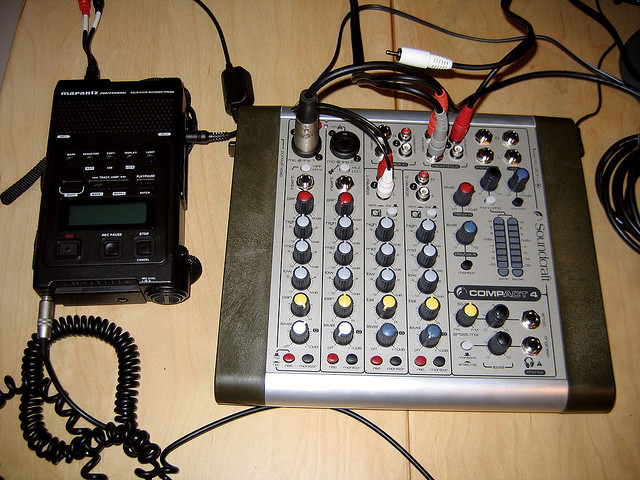Like this article? Chip in to keep stories likes these coming.
A small group of freelance radio journalists are in a stand-off with a non-profit media company that has asked them to give up full copyright in a new contract.
The freelancers allege that AMI Accessible Media Inc., a Toronto-based news organization that produces content for the blind, partially sighted, deaf or hard of hearing, has changed the terms of a new contract so that they will own full copyright to stories — including raw material like the audio interviews and research notes.
Rachel Sanders, one of the freelance radio reporters, says that this creates a hardship for herself and other reporters who want to keep their original recordings to create pieces they can sell elsewhere.
“We rely on being able to make the most of our ideas in order to make a living,” she said. An anonymous source expressed similar concerns about the new contract.
John Melville, the vice-president of programming and production at AMI, told rabble.ca that the advice that AMI has is that they need to be able to have the rights to the content they are producing. The company is not interested in divvying up copyrights to elements of production.
“It is our material at the end of the day; we are the ones who are commissioning this story,” he said.
AMI takes the position that because they are commissioning the stories and that some freelancers use their equipment, and in some cases use AMI’s offices, they have a different relationship with the freelancers than if the freelancers had simply pitched a story to AMI and produced it using their own space and equipment.
Melville also downplayed the station’s reliance on freelance work in a follow-up interview with rabble.ca, saying that AMI staff at their Toronto office produced most AMI original content.
That runs counter to Sanders’ experience freelancing for AMI. She said that since she started working for AMI in June 2014, she has pitched and been assigned a number of radio documentaries, ranging in length from about four to 12 minutes long. Never was she given the impression that there was a different relationship with AMI if she was assigned a story as opposed to pitching it herself.
Sanders says she only visited AMI’s offices in Vancouver once, and produced all work with her own equipment.
The new contract presented to the freelancers in Sept 2014 allegedly included a wage decrease, but Sanders said they were able to negotiate a higher rate.
Anonymous sources close to AMI who spoke with rabble alleged that wages had been steadily decreasing at AMI over the course of the last two years and that there was pressure to trim hours.
For Sanders, however, the value of the work was important. “Their freelance rates were modest, shall we say, but they are a not-for-profit organization and I felt that the work that I was doing for them had a lot of social value,” Sanders says.
Her main concern is retaining copyright so that she can re-tool materials for pitches at other companies — an essential way, she says, that freelancers are able to ensure a sustainable income.
It’s not uncommon to see media companies ask for as much copyright as they can while offering a lower rate, according to Keith Maskell, a staff representative at the Canadian Media Guild. He, along with other CMG staff, have been advising some of the freelancers on contract negotiations with AMI. Don Genova, CMG’s Freelance branch president, also sent a letter on their behalf to AMI in early November.
“If you own everything or if you have bought everything you don’t have to go back to the freelancer every time and say, ‘well we would like to do this with it now, is that ok and how much do you want for it?'” Maskell says. But that cuts off another avenue of potential revenue for freelancers who may want to use the raw material to create pieces for other stories.
Another trend in media is an increasingly reliance on freelancers, while wanting to treat them as if they were employees when it comes to the rights to their work.
“If I’m an employee of a radio station, I don’t own any of the work that I create,” Maskell says — but in return the employee gets a steady income as well as other potential benefits. Freelancers don’t have the same advantages, which is why many argue that they need to retain the raw material so that it can be used to generate more income.
At the CBC, where CMG negotiated the collective agreement, radio freelance reporters still retain the copyright to their work. CBC buys a license to the completed piece that allows them to rebroadcast it whenever needed. CBC editors can also negotiate for full copyright at the freelancers discretion. Sanders had hoped that the AMI contract would be similar.
In Melville’s latest communication with CMG and the freelancers, sent on Jan 15, he reiterated that AMI requires exclusive ownership rights to all of the elements of production.
Sanders is, overall, disappointed she has had to discontinue working with AMI while talks over the contract are at a stand still.
H.G. Watson is a multimedia journalist currently based in Toronto. She was rabble.ca‘s labour intern for 2013-14, and now works at Daily Xtra.




